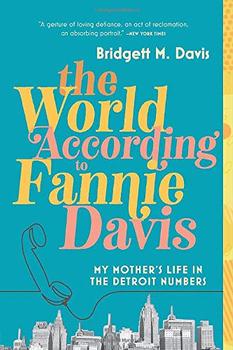Summary | Excerpt | Reviews | Beyond the Book | Readalikes | Genres & Themes | Author Bio

My Mother's Life in the Detroit Numbers
by Bridgett M. Davis
Also, while I knew to preserve our secret, I didn't fully appreciate what could happen if it got out. Yes, Mama could get busted, but I didn't process what that meant: that our good life would end. No one in our family ever talked about it, but we knew. Mama's was a cash business and plenty of money was always literally in our midst, yet my siblings and I understood viscerally that our middle-class prosperity was tenuous, always under threat, because Mama's livelihood was based on a win-or-lose daily gamble. Nowhere was that threat more evident than in our household's nightly ritual: as dusk fell and we all waited for the day's winning numbers to come out, a tense silence moved through our home like a nervous prayer. And once it was past 7 p.m. and we knew those three-digit combinations, we took our cues from Mama. Either she looked relieved, or she looked worried. Either she'd been lucky that day, or her customers had been. If she found a big hit by one of her customers, the energy in our household shifted to the solemn yet brisk activity of gathering and counting money, oftentimes large sums of it. Yet Mama never resented her customers' wins. "People play numbers to hit," she used to say. "So you can't be mad when they do. Business is business."
Each time my mother had a large payout, I didn't realize she could be wiped out. Despite the "good spell" versus "rough patch" nature of her work, Mama never conveyed a sense of fear or instability. She was a domestic magician with incredible sleight of hand. She made our family's life appear stable and secure. And so I might've been anxious beyond my own understanding, but in my day-to-day world, I believed there was nothing to worry about.
I now know that risks were everywhere, coming from different sources, reverberating inward. How hard it must have been to shield us from the vagaries of the business, all run from our home, in full view, where the phones and the doorbell rang constantly and the work of running the Numbers sometimes continued until bedtime. It was risky for Mama to send that "how dare you" message to my first-grade teacher. Doing so could've invited Miss Miller's wrath and retaliation. The year was 1967, mere weeks before Detroit's uprising, its infamous "race riot." Racial tensions ran high. Miss Miller could've reported to authorities her suspicions about our family's income. I now think of the risk Mama took that day as a small revolutionary act, just one of many.
My mother gave us a good life at great expense. I thought I knew her skills as a number runner, that she used her facility with numbers, good judge of character, winning personality, and dose of good luck to build and maintain her business for three decades. But I had no idea just how much of a gambler she was, or the kind of psychological work it took to keep our world afloat.
Scariest of all is this: the only way for me to tell Mama's story is to defy her, by running my mouth.
Part I
Hitsville, USA
Fannie, her brother John, and her sister Florence,
Detroit, 1970s
One
Broadstreet
The address listed on my birth certificate is 8878 North Clarendon. That two-family flat must've felt like a lucky place for my mother, her nicest home yet in Detroit. It's easy to see why, as soon as we moved in, she got a hunch to play the first three digits of our address and adopted a version of that combination as her "pet" number. Soon enough, Mama hit on 788. I like that word hit, its imagery of striking back against a formidable force, of swinging bat against ball for the win, of landing on a great idea. It conjures up a hero's triumph, and my mother is the hero of this story. Her win is mythic in our family lore.
"How much did she hit for?" I once asked Aunt Florence.
"Hell, Fannie hit for big money!" said Florence. "She had fifty dollars or something on that number!"
Excerpted from The World According to Fannie Davis by Bridgett M Davis. Copyright © 2019 by Bridgett M Davis. Excerpted by permission of Little Brown & Company. All rights reserved. No part of this excerpt may be reproduced or reprinted without permission in writing from the publisher.
The purpose of life is to be defeated by greater and greater things.
Click Here to find out who said this, as well as discovering other famous literary quotes!
Your guide toexceptional books
BookBrowse seeks out and recommends the best in contemporary fiction and nonfiction—books that not only engage and entertain but also deepen our understanding of ourselves and the world around us.